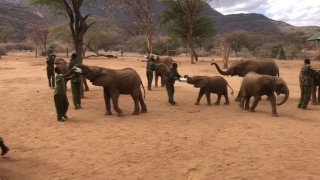
Nestled in the foothills of Samburu County in northern Kenya is Africa’s first community-owned elephant orphanage. This magical place of healing and hope is named Reteti Elephant Sanctuary.
Reteti rescues and releases orphaned and abandoned elephant calves, while at the same time creating much-needed benefits to the local people that live alongside them. It’s a community partnership that is reshaping conservation methods and healing centuries of human-wildlife conflict.
Members of the Samburu community run the daily operations and care for the elephants, it’s a mutually beneficial relationship. As opportunities are created, livelihoods improve and wildlife returns to the area, providing a sustainable economy and natural balance in the ecosystem.
A mutually beneficial community of conservation that is changing mindsets and saving species, according to Reteti Veterinarian Tech, Joseph Lolngojine.
“Initially the community believed that elephants are problematic. They kill livestock and people, but now the concept has changed, and conflicts between wildlife and people have gone down,” he said.
At the core of Reteti are the bottle-feedings, happening multiple times a day. Community members mix bottles of formula, made specifically for each baby elephant. Then a call goes out to the elephants in the wild, and they come bounding into the feed area. Waiting for every elephant is a keeper holding a bottle of formula.
It’s a beautifully choreographed routine based on love, trust, and experience. Each bottle is marked with the name of an elephant calf, the orphans know exactly who their primary caretaker is. A caretaker holding a much-needed nutritious meal blended especially for that young elephant.
Local
Remember Reteti houses calves with no mothers, their moms have often been killed by poachers or abandoned their babies due to drought or lack of food in the region. So, this repetitive feeding process creates strong bonds between keeper and elephant.
“We give people a chance to work with these babies. These keepers are the real mothers to these babies,” said Reteti Keeper Naomi Leshongoro.
Nowhere is that bond more evident than between Naomi and one of her elephants named Nadasoit. Naomi often sings to Nadasoit, with their cheeks rubbing side by side. When the song is done, Nadasoit lets out an appreciative, deep groan.
As Naomi says, “whenever you love them, they love you back.”
Eventually, as the baby elephants grow, keepers will begin to put distance between themselves and the elephants, preparing them to be released back into the wild. It’s a three to four-year process releasing the elephants, so there’s no quick fix. Since being founded in 2016, Reteti has released more than 10 elephants into the wild.
While Reteti’s primary focus is orphaned elephant calves, the sanctuary helps all animals. From injured adult bull elephants to giraffes, to gerenuks, just about any animal in need of care can find it in this unique community-owned sanctuary.
If you missed Down to Earth, The Extinction Crisis on NBC 7 catch up below:



